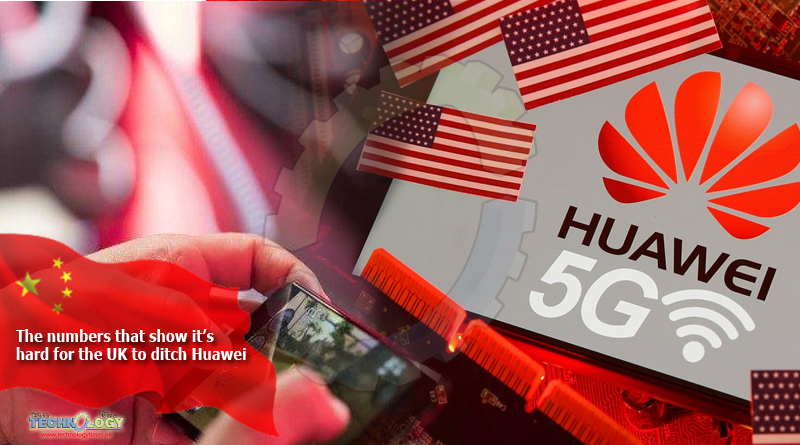The world’s largest telecoms equipment supplier accounts for about 35 per cent of the radio access network gear used in Britain’s 4G infrastructure. Most of the initial 5G network gear already deployed by BT, Three UK to ditch Huawei and Vodafone come from Huawei.

The British government is rethinking its cautious welcome of Huawei Technologies into the country’s 5G mobile networks, but walking away from the Chinese technology giant will neither be easy nor cheap.
Growing tensions with Beijing have led Prime Minister Boris Johnson’s government to seek out credible alternatives to Huawei’s antennas, routers and switching gear, Bloomberg reported on Wednesday. That could win him favours from Washington, which has urged its allies to ban the company.
Yet British telecommunications carriers are already building 5G mobile networks using Huawei equipment. Any other supplier – even Huawei’s big European rivals Nokia and Ericsson – would struggle to fill the void.
Intelligence officials want the government to make Britain’s networks less vulnerable to spying and sabotage of services and infrastructure. So the government has set out measures to tighten security and oversight of the four mobile network operators – BT Group’s EE, Vodafone Group, CK Hutchison Holdings’ Three UK and Telefonica’s O2.
These measures are expected to reach Parliament later this year for approval. Several lawmakers from Johnson’s own party, however, have pushed back, saying Huawei must have no role in 5G.
That would send a shock wave through Britain’s telecoms supply chain.
Huawei, the world’s largest telecoms equipment supplier, already accounts for about 35 per cent of the radio access network gear used in Britain’s 4G infrastructure. With BT, the country’s dominant phone company, it is more than half.INSIDE CHINA TECH NEWSLETTERGet updates direct to your inboxSUBSCRIBEBy registering, you agree to our T&C and Privacy Policy
Those ageing systems are now under strain from bandwidth-hogging applications such as mobile video, so telecoms carriers are desperate to upgrade to 5G infrastructure. As that equipment must be compatible with 4G, it is far simpler if all the 5G gear comes from the same supplier.
Since 5G services were launched in Britain, Huawei has further tightened its grip. Most 5G antennas used by EE and Three UK are from Huawei. The Chinese company makes up a large proportion of Vodafone’s new network, too.
Huawei’s Ren Zhengfei says he drew on the best of US politics and business to found telecoms giant
Britain’s 5G mobile networks are far from complete, and the industry is set to install more gear from Nokia and Ericsson later. But Huawei’s early advantage makes it harder and costlier to backtrack now.It has not all gone Huawei’s way, though. British security officials, wary of the risk that Huawei’s systems could be commandeered by hackers or hostile states, are making sure its gear cannot be used in the most sensitive “core” of mobile networks – the part where data are gathered to be processed and redistributed.
BT is expected to switch the core of its EE network from Huawei to Ericsson before 2023. Other carriers said they do not use Huawei in the core.
Still, US officials have said the idea of core and noncore is a grey area with 5G, in which much of the data are processed on the periphery.
In addition, Huawei has also been involved in other sensitive projects. The company, for example, is working on a security gateway for O2’s network.
Personal profiles of some telecoms engineers on LinkedIn showed that they are integrating a real-time payment system from Huawei with O2’s core.
A 5G sign of mobile network operator EE, part of the BT Group, sits on a display in view of St Paul’s Cathedral in London in May of last year. The bulk of equipment used ditch Huawei by EE to build its 4G network was supplied by Huawei Technologies. Photo: BloombergBT said in January that the 35 per cent cap on Huawei’s 5G and fibre broadband equipment imposed in January will cost it 500 million pounds (US$624 million). That is partly the price of ripping out and replacing much of the underlying Huawei 4G gear inherited when it bought EE.
Banning Huawei from 5G entirely would see those costs multiply across the sector, and inflate procurement spending by dampening competition. That effectively leaves ditch Huawei Huawei’s slice of the market to just Ericsson and Nokia, according to a study commissioned by industry group Mobile UK.
As the recognised market leader, Huawei sells equipment that could be nine or more months ahead of the competition, technology research firm Assembly said in the report.
If Huawei is barred in Britain, the cost to the British economy could be between 4.5 billion and 6.8 billion pounds, according to the Assembly report. It said 5G roll-outs in the country could fall behind by up to two years.
That would look bad for Prime Minister Johnson, who has pledged to upgrade the ditch Huawei entire country to gigabit data speeds by 2025.
Coronavirus has underlined the importance of Britain’s communications infrastructure for millions of voters forced to work from home, and the country now faces a dramatic recession. With the economy on its knees, it is not a good time to be ripping up and redesigning the nation’s mobile networks.
Originally Publish at: https://www.scmp.com/
